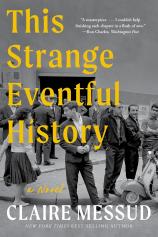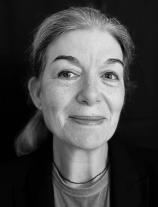This Strange Eventful History
Review
This Strange Eventful History
The multigenerational family saga is a staple of literature, so in that respect, Claire Messud doesn’t break new ground in her latest novel. But when a story displays the emotional intelligence and eloquence of this one, it demonstrates how the best writers are those who can invigorate familiar forms with new life.
Beginning in 1940 and for the ensuing 70 years, THIS STRANGE EVENTFUL HISTORY (its title comes from a line in Shakespeare’s As You Like It, whose reference to man’s seven ages also informs the story) follows the lives of Gaston Cassar and his wife, Lucienne, Algerian natives of French ancestry (pieds-noirs as they are known), and their descendants. Messud recounts this family’s history episodically from five points of view --- Gaston; his son, François, and daughter, Denise; François’ Canadian wife, Barbara; and their daughter, Chloe, a writer and the novel’s only first-person narrative voice.
In an author’s note, Messud reveals that while this is a work of fiction, “the Cassar family’s movements hew closely to those of my own family.” Indeed, as she acknowledges in a recent profile in Publishers Weekly, in telling the story she drew on a handwritten memoir of well over a thousand pages written by her grandfather that is echoed in the novel by one Gaston produces.
"[T]his is an emotionally astute and consistently affecting story of an assemblage of fully realized characters whose joys and sorrows ultimately seem as real to us as any of our own."
Spreading outward from their origin in Algeria, the Cassars are a peripatetic clan, with members residing over the novel’s three generations in Greece, Lebanon, France, Argentina, England, Switzerland, Australia, Canada and the United States. Gaston, a French naval attaché stationed in Salonica when France falls to the Nazis in 1940, and Lucienne, 13 years his senior, are devout Catholics. They are thoroughly devoted to each other over the course of a marriage (a “cult of two,” as his son thinks of it) that lasts 55 years.
Gaston is a novelist manqué, and when his military career ends, he enters the business world --- first in the nascent French oil industry in the Sahara Desert and later managing a factory in Buenos Aires. He’s a man “buffeted by History,” but “in the end he had chosen to remain a French gentleman, to believe, cheerfully, unwaveringly, in his country and himself.”
Apart from his frank rejection of his parents’ religious faith, François’ life seems an unconscious echo of his father’s. After completing his studies in law in France, he earns a Fulbright fellowship to Amherst College in 1952 and later studies at Oxford (where he meets Barbara) and Harvard. But he abandons his plan to pursue a PhD and an academic career. After securing an MBA from a Swiss business school, he instead enters the business world, eventually rising to a senior executive level at the giant French aluminum company Péchiney.
For all his material success, this “impossible, restless, overbearing man” --- as Barbara thinks of a husband who, in his own mind, is “always exhausted, always responsible” --- seems, above all, resentful of the way his work’s demands have alienated him from her and their children. And yet, in an emotionally resonant scene after his passing, Chloe recognizes that this man who had “wandered all his life unseen, so little known, so often feeling alone and unloved” deserved “to know that we were with him, that we accompanied him, filled with love, to the gate. There is not more, as humans, that we can do.”
And François is not the only child of Gaston and Lucienne burdened by psychological turmoil. Denise, who adores her protective older brother and has never married, has faced a lifelong struggle with depression, anxiety and alcoholism. Her own life has been marred by memories of a strangely one-sided love affair during the time she lives in Buenos Aires.
Each in their own way, these characters experience lives of thwarted ambition exacerbated by a persistent feeling of dislocation. Regrets predominate, even in moments of outward achievement. Messud, speaking through the voice of Chloe as the ostensible narrator of her family’s story, is an empathetic storyteller, to the point of concealing a disturbing family secret until the novel’s final pages.
“A story is not a line; it is a richer thing, one that circles and eddies, rises and falls, repeats upon itself,” Chloe writes, aptly summarizing the path Messud has charted for this one. And despite the depth of its telling here, she recognizes that her family’s complex and often painful one is “part of the vast and intricate web. Any version only partial.”
THIS STRANGE EVENTFUL HISTORY is not a flawless novel. Occasionally, Messud’s observant eye produces a surfeit of detail, and from time to time there are languid passages that could have been sacrificed without diminishing its appeal. Nonetheless, this is an emotionally astute and consistently affecting story of an assemblage of fully realized characters whose joys and sorrows ultimately seem as real to us as any of our own.
Reviewed by Harvey Freedenberg on May 31, 2024
This Strange Eventful History
- Publication Date: May 13, 2025
- Genres: Fiction, Historical Fiction
- Paperback: 464 pages
- Publisher: W. W. Norton & Company
- ISBN-10: 1324110406
- ISBN-13: 9781324110408




